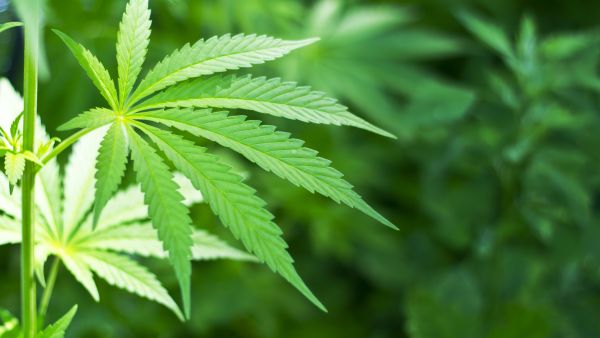The never-ending story of Lebanon’s law enforcement agencies and its hashish crops is old news. This year, it seems the government has been reluctant about destroying hashish crops, perhaps because it is ashamed of lying to the farmers for so long. Indeed, lying is perhaps a bigger sin than growing al-Mabroukeh, the “blessed plant,” as the farmers call it.
Among the inscriptions of Baalbeck’s ruins, specifically in the Roman-era temple of Bacchus, one might spot an ancient inscription of the cannabis plant known as hashish – side by side with inscriptions depicting wheat. At least, this is what some claim.
Did the Romans consume hashish? Well, this question may require a deep historical investigation, but it seems to greatly intrigue Interior Minister Marwan Charbel.
Nearly a year ago, Charbel succeeded in containing the anger of hashish farmers in the Bekaa, specifically in the village of Yammouneh, after bloody clashes erupted with the army and security forces. The farmers in question are not drug dealers. They are poor, and the revenues from their crops are barely enough to support their families, unlike the hashish dealers who amass huge fortunes.
The farmers are the weakest link in the hashish chain. Some of them have never even consumed hashish. Yet they are used to the security forces each year assaulting their fields. All their toil is then destroyed before their very eyes, and rarely does this annual ritual ever pass without incident.
This year, in September, there may not be any clashes. Officially, the Interior Ministry and the security forces are undecided, but all signs so far indicate that there will be a full crop this year, undisturbed by the government’s yearly destruction of hashish plants.
There are many reasons for this. First, according to a government official, “The last thing the current security situation needs is more clashes.” Implicit in this view is that the “threat” of hashish is not worthy of government attention compared to other threats.
This year, the minister of interior might feel ashamed vis-à-vis the farmers, whom he promised last year to find solutions for their issues, including working on finding alternative crops. But in truth, talk about alternative crops has been around since the Taif Accord, which ended the civil war in Lebanon more than two decades ago.
Charbel could not fulfill his promise, except partially, because “the Ministry of Finance refused to give the farmers the allocations agreed to in the cabinet, claiming that there were insufficient funds,” as Charbel said, adding that “the government will once again appear like a liar.” No one can envy Charbel for the position he is in.
Speaking to Al-Akhbar, the interior minister said, “The government had allocated 35 billion Lebanese pounds annually to aid the farmers, as part of a five-year project for alternative crops to hashish. Unfortunately, none of this has been put into practice.” The plan included finding other types of crops that could be grown in the Bekaa, building irrigation systems, and providing assistance for cattle grazing.
Charbel went further, saying that he finds continued talk about alternative crops irritating, saying that it seems this will remain forever a pipe dream. He then spoke about legalizing the cultivation of hashish.
“There are many countries in the world where narcotic plants are grown, specifically hashish, such as Turkey and Morocco. These countries have managed this process superbly, and people there grow these crops under the supervision of the authorities. The authorities then buy the crops from them each year,” he said.
Charbel raised this issue in a past cabinet session. Bear in mind that for years now, there have been plans in place in this regard, but they have all been ignored. Charbel’s proposal has met the same fate.
Every ministry blames every other ministry for the problem. So, where is the problem, and what is stopping these plans from being implemented? You will not receive any convincing answer from Lebanese officials.
Nevertheless, some have very specific answers. In their view, the issue has to do with an entire structure engaged in the trafficking of hashish. This structure, which wields tremendous influence on the government, reaps huge annual profits.
The proponents of this view like to draw attention to what they call a paradox: How can one explain the considerable increase of hashish in the market during the years when the hashish crops were destroyed? This, they say, clearly indicates that there are some entities controlling the market through local production.
Indeed, why all this enthusiasm against hashish every year? What is the damage caused by this plant to begin with? The authorities seem to deal with cannabis as though it is more dangerous than cocaine or heroin.
In reality, the issue is all about class: Cocaine is for rich people, while everyone can afford hashish. It is easy for the security forces to flex their muscle against the poor and appear as serious enforcers of the law.
Some government officials agree with this view, and even go further, saying that the cultivation of tobacco was also once illegal until the government imposed regulations and started buying crops from the farmers. They ask, why is the cultivation of hashish not regulated in the same manner?
The answer could prompt an observer to believe that there is indeed a “mafia” inside the government deliberately pushing to maintain the status quo. The gang in question continues to benefit from the lack of laws regulating hashish and from illegal trafficking, which generates huge profits. The stronger the prohibition, the higher the prices.








